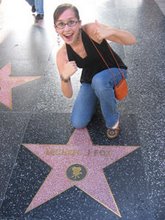This post also appears online at MediaBlvd Magazine.
Somehow I had managed not to see anything by Morgan Spurlock until last week when I went to a screening of his latest documentary, POM Wonderful presents: The Greatest Movie Ever Sold, a look into the world of product placement (a.k.a. "embedded marketing") in film and television. Even having missed his debut, Super Size Me, I think I can understand critics who say that the premise negates the necessity of the movie in this new documentary as in that one. Of course eating at McDonalds for every meal for a month will take its toll, and of course using sponsors to finance a film about embedded marketing will shed light on the not-secret fact that advertising is used to offset the cost of filmmaking in a time when revenue is way, way down for the movie business. While Greatest Movie does provide a few interesting things to think about, it feels as though Spurlock is going through the motions, holding back from being fully along for the ride that the journey could take him on.
It is funny to see Spurlock wink at the camera for over an hour, pitching product integration ideas to potential investors, then cutting to a scene in which the exact idea is carried out, or saying multiple times, "this scene right now is in the movie." A few times, he does make mention of the fact that by signing contracts with his sponsors, he is not sure he can remain an objective documentarian. I wish he had investigated this further. What does "selling out" do to the integrity of the filmmaker? How would this process impact any future films he makes? I couldn't help but think of Kirby Dick's wonderfully meta look into the MPAA, This Film is Not Yet Rated, which provides layer upon layer of insight into what goes into rating and releasing a movie, illustrating the process itself. Compared to that favorite of mine, Greatest Movie comes up short.
There are a few attempts to show how product placement has gone farther than we all realize, such as when Spurlock discovers that public schools are selling advertising space on athletic fields, CCTV, and school buses. He even goes to Sao Paolo, Brazil, a city that has banned advertising on public buildings, but neither vignette goes far enough. He interviews Sao Paoloan business owners to see how the advertising ban has affected business, but I did not get a sense of the real toll it has taken on the economy. The representatives of the Florida school district where Spurlock buys advertisements for his movie talk about their schools' need for money, but do not really say what impact they think the advertising has on the students.
Though I'm being critical, because I think that Spurlock could have provided us with a more well-rounded look at the long-term impact of sponsorship, I did enjoy watching Greatest Movie. When he interviews members of OK Go to ask them if they'll participate by writing the movie's theme song, I could not stop laughing at the OK Go product placement so blatantly shown onscreen. It was amusing to see how Spurlock had to stay true to his promises to the sponsors by conducting interviews at Sheetz convenience stores, or by including full 30-second commercials in the film. Nothing will top what he does to shill Mane 'n Tail shampoo.
But when all is said and done, I felt I had learned very little. I learned what it was like for a documentarian to secure corporate sponsorship to finance his movie. But I wish I'd learned a bit more about how product placement in movies and television shows has affected the economy of the industry. What was the outcome of Spurlock's experiment - could he consider himself an objective documentarian, or has he just gone through the motions of financing his film? Altogether, it's an enjoyable movie to watch, but I didn't feel that it really served its intended purpose.
Subscribe to:
Post Comments (Atom)





No comments:
Post a Comment